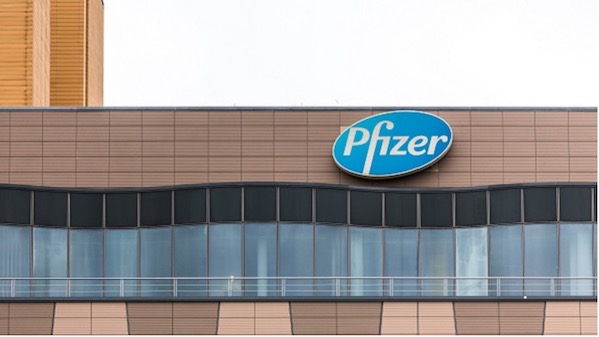Pfizer Drops Early-Stage Obesity Drug Following Disappointing Phase I Data
June 28, 2023
Source: drugdu
 307
307
By Tristan Manalac
 Pictured: Pfizer sign on building/Tobias Arhelger/Adobe Stock
Pictured: Pfizer sign on building/Tobias Arhelger/Adobe Stock
Pfizer is discontinuing the clinical development of its investigational GLP-1 receptor agonist lotiglipron, which was being developed for obesity and Type 2 diabetes mellitus, the company announced Monday.
The decision to cut lotiglipron from Pfizer’s pipeline comes after the company detected heightened concentrations of liver transaminases in patients treated with the investigational drug. Lotiglipron was being evaluated in two Phase I drug-drug interaction studies and one Phase II trial. Pharmacokinetic data from the two Phase I studies also contributed to the candidate’s discontinuation.
None of the patients developed liver-related symptoms or similar side effects and neither required medical intervention. Pfizer also did not document signs of liver failure among these patients. The company will present lotiglipron data at an upcoming conference or will submit it for publication in peer-reviewed journals.
With lotiglipron’s discontinuation, Pfizer will instead focus on the clinical development of its other GLP-1 receptor agonist candidate danuglipron, which is also being studied for obesity and Type 2 diabetes mellitus. Pending the results of its current Phase II trial, the company will push danuglipron into late-stage development with plans set to be finalized later this year.
“If successful in clinical trials and approved, danuglipron could be in a prime position to differentiate based on profile, including full receptor agonism, which we believe has the potential to translate to robust efficacy,” William Sessa, Pfizer’s senior vice president and chief scientific officer for internal medicine, said in a statement.
Like other GLP-1 receptor agonists, such as Novo Nordisk’s Wegovy (semaglutide) and Eli Lilly’s Mounjaro (tirzepatide), danuglipron works by mimicking the incretin hormone GLP-1 to stimulate the glucose-dependent secretion of insulin from the pancreas.
Unlike other GLP-1 receptor agonists, however, which are peptides and are typically administered through injections, Pfizer’s candidate is a small molecule drug that can withstand the gastrointestinal tract and be administered orally.
In a humanized mouse model study, treatment with danuglipron induced insulin release and suppressed feeding at a comparable degree as its injectable counterparts. Pfizer followed this up with Phase II data published May 2023 in JAMA Network Open. Compared with placebo, all danuglipron doses led to statistically significant reductions in HbA1c and fasting plasma glucose and body weight after 16 weeks of treatment.
The candidate was also safe, leading to only one treatment-related serious adverse event. Most of the other side effects were mild or moderate in severity.
Danuglipron treatment also did not lead to the transaminase enzyme elevations observed with lotiglipron, according to Pfizer’s Monday announcement.
Read more on
- The first subject has been dosed in the Phase I clinical trial of Yuandong Bio’s EP-0210 monoclonal antibody injection. February 10, 2026
- Clinical trial of recombinant herpes zoster ZFA01 adjuvant vaccine (CHO cells) approved February 10, 2026
- Heyu Pharmaceuticals’ FGFR4 inhibitor ipagoglottinib has received Fast Track designation from the FDA for the treatment of advanced HCC patients with FGF19 overexpression who have been treated with ICIs and mTKIs. February 10, 2026
- Sanofi’s “Rilzabrutinib” has been recognized as a Breakthrough Therapy in the United States and an Orphan Drug in Japan, and has applied for marketing approval in China. February 10, 2026
- Domestically developed blockbuster ADC approved for new indication February 10, 2026
your submission has already been received.
OK
Subscribe
Please enter a valid Email address!
Submit
The most relevant industry news & insight will be sent to you every two weeks.



